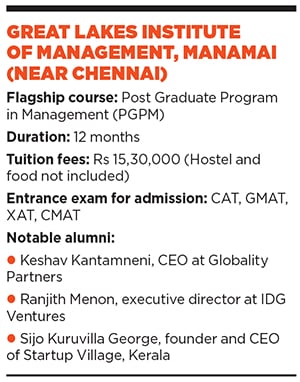Off the beaten path: GLIM's unique approach to creating future managers
With experiential learning, and soon, technological competence, the Great Lakes Institute of Management in Chennai is trying out a different approach to creating future managers


A few months ago, Professor Bala Balachandran was driving his Tesla in Chicago when it suddenly developed a snag and came to a halt. When he called the company’s helpline, even as he was talking, Tesla’s mechanics remotely took control of the car and set things right. The founder and dean of Great Lakes Institute of Management (GLIM) in Chennai and professor at Kellogg School of Management at the Northwestern University, Illinois recounts this incident to illustrate how the world has changed and how management education too needs to change rapidly to keep pace with these changes.
“I think, by and large, management education in India is not relevant. Some schools are factoring in the transformation that, among other things, business intelligence, business model disruption, stealth competition and design thinking are bringing about in the way businesses are managed,” he says. “But many are still teaching the same 10-year-old curriculum and they are not realising that they are getting obsolete by the second.”
Professor Balachandran, 79, who started his teaching career in 1960 and has won many awards for teaching, has for long called for an overhaul of management education in India. He started Great Lakes Institute of Management in 2004 with the objective of offering a cutting-edge curriculum that anticipates the changes in the business environment.
“One differentiating factor at Great Lakes is its experiential learning system. The teaching is heavily case study-based,” says a student, Garvita Manwani, who is currently pursuing the Post Graduate Program in Management (PGPM) at GLIM. “Also, the empirical study that almost runs throughout the programme is a great way of learning real-world business challenges. We have to come up with a solution to address these challenges and this is done with the guidance of a faculty mentor and a guide from the industry.”Between January 15 and March 31 every year, students at GLIM also do real-time trading in stocks, bonds, currencies and commodities. Typically, four students come together and invest Rs 25,000 each, using the college’s Bloomberg terminal to trade. “It is another form of experiential learning,” says Professor Balachandran.
GLIM also offers a unique rural-agricultural exposure. The institution has adopted 25 villages in the area surrounding the campus and as part of what it calls a ‘Karma-Yoga project’, students spend every Thursday in one of the villages to understand the rural economy and ‘experientially learn transformational leadership’. “This Leadership Experiential Program, a one of its kind in India, helps us understand rural India better, which helps us both professionally and personally. It is also one great way of teaching humility to future business leaders,” says Digant Dutta, another PGPM student.
Major corporates, too, seem to see value in the students passing out of GLIM. Wipro, Infosys, TCS, Cognizant, HCL, HSBC, HDFC Bank, Accenture and Amazon are some of the companies that have recruited from the institution.
“GLIM’s approach to management education is refreshing. We had complete freedom in what we could do. Irrespective of what we choose to major in, we can attend any of the classes. The Karma-Yoga project got us grounded to the reality of India,” says Sangeetha Deiveegarajan, who graduated in 2010 and today works with Wealth Advisors (India), one of India’s large boutique wealth management firms, based in Chennai.
Students are also taught Mandarin. “We were not only taught Mandarin but also educated about Chinese culture and their way of doing business. It has really helped me to relate better when you hear something about China.”
Professor Balachandran has a reason for including Mandarin as part of the curriculum. “Economically, China is our biggest competitor. We need to learn their language before they learn ours. If you want to do business in China, it is important to understand the Chinese mentality and culture,” he says.
He is now in the process of trying out something different in management education—a five-year integrated B Tech and MBA course that will be offered at the new Great Lakes University at Sri City in Andhra Pradesh. The course will be offered starting July 2017 and enrol 120 students. “In the first three years they will be taught engineering, in the fourth year they will be put through a course in nanotechnology, biotechnology, mathematics, design thinking, economics, psychology and law. In the final year, the students will be taught management,” says Professor Balachandran. Such a course, he adds, will help create managers and CEOs who are also technologically competent. “In today’s fast-changing world, where disruption is coming from all quarters, it is important for CEOs to be technically competent,” he says.
First Published: Oct 27, 2016, 06:08
Subscribe Now